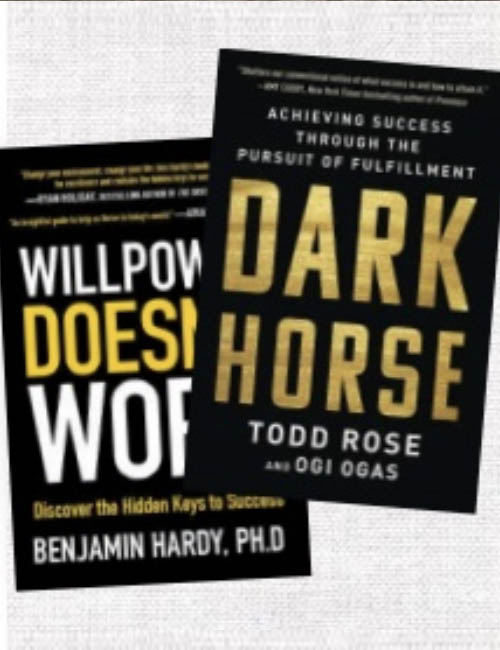Reviewed by Pat Sabena, psabena@qual.com
Sabena Qualitative Research, Fairfield, CT
There is a surfeit of books these days urging us to find our best selves through self-improvement. These two books promise excellence and fulfillment through different strategies. However, a thorough reading of each book uncovers the paradox that these different paths work best not only for some people but also perhaps for many.
Benjamin Hardy, the author of Willpower Doesn’t Work, is Medium.com’s most read writer and a PhD candidate in industrial and organizational psychology at Clemson University. Most of us probably agree with him that our willpower fails when trying to lose weight, exercise more, or fulfill a New Year’s resolution. Hardy’s point of view is that, instead, you need to “change your environment to change your life.” But changing one’s external world certainly sounds daunting, so Hardy shows how small changes in our surroundings can lead to big changes.
His strategies include requisite daily journaling to reconnect deeply with yourself and developing a morning ritual that puts you into a peak state to frame the day. Journaling in a space sacred to you deepens the writing and the morning ritual, even if that sacred space is in your car parked a few blocks away from home. He also offers examples to eliminate stuff and eliminate distractions while surrounding yourself with people who “remind you more of your future than your past.”
He recommends “forcing functions,” which are “self-imposed situational factors that literally force you to act and achieve what you intend.” This turns a behavior you’d like into something you have to do, thereby avoiding self-sabotage, such as leaving your cell phone in your glove compartment after work to force you to spend less time on it. Hardy cites numerous stories of how specific people chose to change their environments and thereby evolved into the individuals they wanted to become.
He builds on copious existing research as well as his own experiences growing up in a broken family afflicted by addiction and, along with his wife, eventually becoming foster parents. Hardy explains that lasting personal change, high performance, creativity, and productivity can occur only by strategically outsourcing your desired behavior to goal-enriching environments.
Todd Rose and Ogi Ogas are the directors of the Dark Horse Project at the Harvard Graduate School of Education. Ironically, their book Dark Horse insists that the standard academic path (be the best in elementary and high school, go to the best universities for undergraduate and graduate degrees, get the best job, move up the ladder fast) often leads to deeply unhappy or unfulfilled individuals. Sharing fascinating stories of many real people’s lives, a common theme emerges that they did not feel they “fit” when they had blindly followed a career and/or life path. Most dark horses may have plodded along for years, like a round peg in a square hole, before finally realizing they were not living a meaningful life.
The authors show how this “Standardization Covenant” fails dark horse individuals who need to meander their own trail to a life of happiness and fulfillment that fits them personally. What’s more, these apparently one-of-a-kind journeys can offer principles that work for anyone no matter who they are or what they hope to achieve. Specifically, Rose and Ogas encourage us to “know your micro-motives,” “know your choices,” “know your strategies,” and “ignore the destination.” Not only are these principles different from the standard way, they are also likely to encourage some of our young people not to take on outrageous student loan debts that will hobble them for life.
I enjoyed both of these books, especially Dark Horse. What struck me about reading them back-to-back is how much they, like America, emphasize the individual. Not in a selfish way, but rather in our unique Jeffersonian ideal that we each have the right to the pursuit of happiness. It is further testimony to the motives, choices, and strategies that happened to shape my own life experience as a happy qualitative researcher for more than half a century.


Be the first to comment